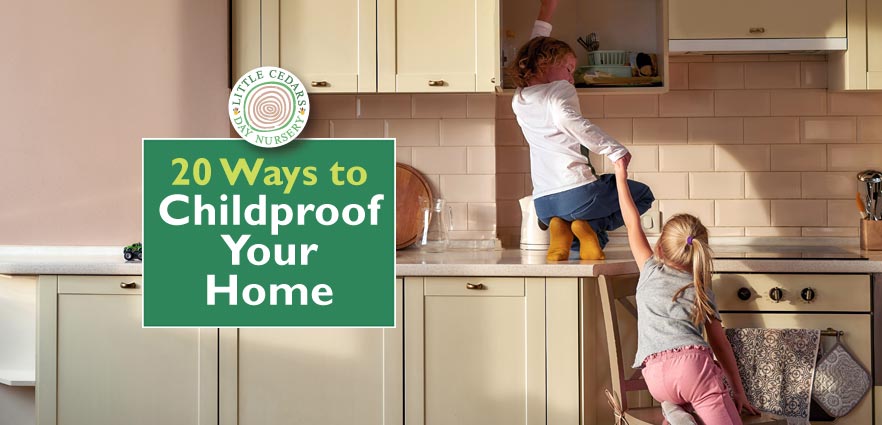
 Once babies can crawl, they’re well on their way to becoming toddlers. Then, in no time at all, they can suddenly become fully mobile, able to climb and even be out of your sight in just seconds. With this new mobility comes exploration, the potential for danger and even possible injury. With that in mind, we bring you 20 ways to begin childproofing your home to keep little ones safer and further from harm’s way.
Once babies can crawl, they’re well on their way to becoming toddlers. Then, in no time at all, they can suddenly become fully mobile, able to climb and even be out of your sight in just seconds. With this new mobility comes exploration, the potential for danger and even possible injury. With that in mind, we bring you 20 ways to begin childproofing your home to keep little ones safer and further from harm’s way.
1. Safety Gates
 Safety gates, strategically placed around the home, are a great way to keep your little one confined to a safer, controlled area. There are lots of different types available, whether new or second-hand, but make sure they’re made to UK safety standards. Some are suitable for doorways and others for stairs. Using safety gates to keep young children away from stairs, kitchens and other hazardous places really is a no-brainer and a great place to start with your childproofing exercise.
Safety gates, strategically placed around the home, are a great way to keep your little one confined to a safer, controlled area. There are lots of different types available, whether new or second-hand, but make sure they’re made to UK safety standards. Some are suitable for doorways and others for stairs. Using safety gates to keep young children away from stairs, kitchens and other hazardous places really is a no-brainer and a great place to start with your childproofing exercise.
2. Clear Glass Safety
 Clear floor-to-ceiling glass is also a hazard once children are mobile. Therefore such glass, whether part of a window, patio door, glass partition or conservatory should ideally not be clear all the way down. Otherwise, an unsuspecting child — or even adult — could find themselves running straight through what they thought was an opening. An easy way to ensure glass can be seen as a barrier is to use strategically placed stickers dotted around on the glass. These could be fun and attractive, for example little flower or butterfly stickers. Alternatively, you can even buy modern-looking ‘frosting’ strips that, when applied in one or more horizontal stripes or shapes at an appropriate height, will make clear glass more visible to you and your child. Guards are, of course, another possible temporary option.
Clear floor-to-ceiling glass is also a hazard once children are mobile. Therefore such glass, whether part of a window, patio door, glass partition or conservatory should ideally not be clear all the way down. Otherwise, an unsuspecting child — or even adult — could find themselves running straight through what they thought was an opening. An easy way to ensure glass can be seen as a barrier is to use strategically placed stickers dotted around on the glass. These could be fun and attractive, for example little flower or butterfly stickers. Alternatively, you can even buy modern-looking ‘frosting’ strips that, when applied in one or more horizontal stripes or shapes at an appropriate height, will make clear glass more visible to you and your child. Guards are, of course, another possible temporary option.
3. Cupboard Security
 Whether they’re in the kitchen, on the landing, under the stairs or elsewhere, cupboards can represent a number of possible hazards to children. Fingers can be hurt if shut in the doors or near the hinges and the cupboards themselves can contain any number of dangerous things. Therefore, it’s wise to obtain some childproof locks, latches or catches for cupboard doors that you don’t want your child to be able to open. These are often simple, easy to affix (and remove when children are older) and can be inexpensive if you shop around.
Whether they’re in the kitchen, on the landing, under the stairs or elsewhere, cupboards can represent a number of possible hazards to children. Fingers can be hurt if shut in the doors or near the hinges and the cupboards themselves can contain any number of dangerous things. Therefore, it’s wise to obtain some childproof locks, latches or catches for cupboard doors that you don’t want your child to be able to open. These are often simple, easy to affix (and remove when children are older) and can be inexpensive if you shop around.
4. Window & Door Security
 Similarly, ensure that entrance/exit doors throughout your home are secure where they need to be. Front doors, doors to gardens, balconies and patios all need to be particularly well secured from access by young children, whether through locks, latches or specialist childproofing mechanisms (there are lots available on the market). Similarly, windows need to be secure and that’s never more true than when there’s a nasty drop the other side.
Similarly, ensure that entrance/exit doors throughout your home are secure where they need to be. Front doors, doors to gardens, balconies and patios all need to be particularly well secured from access by young children, whether through locks, latches or specialist childproofing mechanisms (there are lots available on the market). Similarly, windows need to be secure and that’s never more true than when there’s a nasty drop the other side.
5. Door Stops & Wedges
Door stops and door wedges are a simple and inexpensive way to make doors safer to little ones. With children’s fingers small enough to get into hinges, under doors or to be potentially shut in them when they close, door stops, door wedges and ‘finger guards’ are a complete no-brainer and are quick and easy to affix.
6. Hazardous Machines & Gizmos
 Everything with a motor or moving parts is a potential hazard to small children. The obvious items to keep well beyond their reach are tools like drills and saws along with household appliances like vacuums, food mixers and coffee-makers. However, larger things like washing machines, tumble driers, dishwashers and any appliance with a door that they could climb into are also potentially very dangerous for little ones. It may even take a combination of precautions to keep children safe from such hazards.
Everything with a motor or moving parts is a potential hazard to small children. The obvious items to keep well beyond their reach are tools like drills and saws along with household appliances like vacuums, food mixers and coffee-makers. However, larger things like washing machines, tumble driers, dishwashers and any appliance with a door that they could climb into are also potentially very dangerous for little ones. It may even take a combination of precautions to keep children safe from such hazards.
7. Hazardous Products
 Another reason to keep little ones out of cupboards and certain areas of the home is to keep them safe from hazardous products. Some things will be poisonous and others may be corrosive. Dishwasher and laundry pods need to be stored well out of children’s reach as do medicines, cleaning products and DIY items like paint, solvents and glues. Any of these could prove fatal if they get into little hands. Remember, too, that children learn to climb, so even cupboards high up need to be secured.
Another reason to keep little ones out of cupboards and certain areas of the home is to keep them safe from hazardous products. Some things will be poisonous and others may be corrosive. Dishwasher and laundry pods need to be stored well out of children’s reach as do medicines, cleaning products and DIY items like paint, solvents and glues. Any of these could prove fatal if they get into little hands. Remember, too, that children learn to climb, so even cupboards high up need to be secured.
8. Smoke Alarms
 Smoke alarms suitably located around the home are one of the most basic precautions any parent or carer can make. Countless lives are saved each year due to smoke alarms. Sadly, though, many are also lost due to them not being present or due to batteries having expired. So, ensure that smoke alarms are ideally in every room as well as being in hallways, stairwells and so on. Also test them regularly to ensure batteries are in good, working order.
Smoke alarms suitably located around the home are one of the most basic precautions any parent or carer can make. Countless lives are saved each year due to smoke alarms. Sadly, though, many are also lost due to them not being present or due to batteries having expired. So, ensure that smoke alarms are ideally in every room as well as being in hallways, stairwells and so on. Also test them regularly to ensure batteries are in good, working order.
9. Carbon Monoxide Alarms
It’s the same with carbon monoxide alarms although you usually need less of them (it’s best to follow instructions when you’ve purchased them). Carbon monoxide is a silent killer as it can’t be seen or smelt. Detectors are therefore wise in homes that have a heater or heating system, even if it’s in an adjoining garage or property (gas can travel). Remember to check and test batteries too, of course.
10. Electric Point ‘Protector’ Inserts — Good or Bad?
Electrical shocks are nasty, even when a household has circuit-breakers (as indeed they should). Therefore, many might assume that plastic socket ‘blanking’ inserts would be a wise addition to electrical outlets around the home, particularly as they are often located within easy reach of little fingers. Nowadays in the UK, however, power socket blanking inserts have become controversial and indeed the Department of Health has condemned their use due to safety concerns. More information about the dangers of socket inserts can be read in the Department of Health’s safety alert here. Ofsted, meanwhile, does not offer any specific guidance on the topic. Children also need to be educated generally about electrical hazards, of course, keeping away from power points, avoiding yanking out plugs, keeping water away from power sources and so on.
11. Wire Tidiness
 For similar reasons, it’s also wise to keep electrical wire cords tidy and out of reach of little ones. If they were to pull a kettle lead or trip over an electric iron lead, for example, the potential outcomes do not bear thinking about. Cords on telephones and electrical appliances are also choking hazards, of course. So, keep them out of harm’s way i.e. well out of grabbing and tripping distance.
For similar reasons, it’s also wise to keep electrical wire cords tidy and out of reach of little ones. If they were to pull a kettle lead or trip over an electric iron lead, for example, the potential outcomes do not bear thinking about. Cords on telephones and electrical appliances are also choking hazards, of course. So, keep them out of harm’s way i.e. well out of grabbing and tripping distance.
12. Pull Cord Precautions
 Dangling pull-cords on window blinds have, regrettably, been the cause of several deaths around the world. If they’re dangling down, small children could get these wrapped around their necks and potentially strangle themselves. Any toggle on the end of the cords can also be a choking hazard. So, if you have any of these in your home, ensure they are tied safely out of reach, ideally using the safety fitments that often come with new blinds, or are available inexpensively. The same kind of approach may also be needed in rooms where the electrical light, shower or extractor switch comes in a pull-cord form.
Dangling pull-cords on window blinds have, regrettably, been the cause of several deaths around the world. If they’re dangling down, small children could get these wrapped around their necks and potentially strangle themselves. Any toggle on the end of the cords can also be a choking hazard. So, if you have any of these in your home, ensure they are tied safely out of reach, ideally using the safety fitments that often come with new blinds, or are available inexpensively. The same kind of approach may also be needed in rooms where the electrical light, shower or extractor switch comes in a pull-cord form.
13. Heated Appliances
 Heat sources are a terrible hazard for children and adults alike. However, little ones will seldom realise the hazards, so parents and guardians need to ensure that all heat sources are kept well out of children’s reach. Examples include hair straighteners, irons, kettles, sandwich makers, pots and pans that have been on the cooker, and so on. With regard to cookers, hobs, grills, and ovens, it’s the children that need to be kept away from them, of course. Even a switched-off oven can still have a door that’s retained enough heat to burn little hands. A combination of several of the precautions outlined in this page may therefore help to make complete safety feasible in the kitchen and anywhere there are appliances that heat up.
Heat sources are a terrible hazard for children and adults alike. However, little ones will seldom realise the hazards, so parents and guardians need to ensure that all heat sources are kept well out of children’s reach. Examples include hair straighteners, irons, kettles, sandwich makers, pots and pans that have been on the cooker, and so on. With regard to cookers, hobs, grills, and ovens, it’s the children that need to be kept away from them, of course. Even a switched-off oven can still have a door that’s retained enough heat to burn little hands. A combination of several of the precautions outlined in this page may therefore help to make complete safety feasible in the kitchen and anywhere there are appliances that heat up.
14. Home Heating
 Radiators, heaters and, of course, fires, stoves and any other heat source in fireplaces are terribly dangerous things for children. Therefore radiator covers, fire guards, permanent vigilance and a good dose of common sense should enable parents and carers to keep children well away from such heat sources.
Radiators, heaters and, of course, fires, stoves and any other heat source in fireplaces are terribly dangerous things for children. Therefore radiator covers, fire guards, permanent vigilance and a good dose of common sense should enable parents and carers to keep children well away from such heat sources.
15. Sharp Objects
Similarly, supervising adults must ensure that all sharp objects are well out of reach of little hands.  Scissors, knives, razors, needles, hand tools like saws and screwdrivers must be locked well away and never left lying around. Even pens and pencils are sharp and dangerous around eyes, when you think about it. So, it’s imperative that parents/guardians are vigilant and supervise at all times when it comes to anything sharp or pointed.
Scissors, knives, razors, needles, hand tools like saws and screwdrivers must be locked well away and never left lying around. Even pens and pencils are sharp and dangerous around eyes, when you think about it. So, it’s imperative that parents/guardians are vigilant and supervise at all times when it comes to anything sharp or pointed.
16. Sharp Corners
Corners and edges of furniture or household equipment can be nasty things for children to bang themselves against, particularly corners of things like stone coffee tables or timber units. You wouldn’t want to fall and bang your head against a corner like that! Luckily, it’s possible to purchase ‘bumper covers’ (a.k.a. ‘bumpers’) that can pad hard edges and corners such as these. Then, if the worst happens, at least the child is protected. Vigilance will still be needed, however, as bumpers can only go so far.
Vigilance will still be needed, however, as bumpers can only go so far.
17. Choking Hazards
Choking on small objects is, of course, a common worry for parents of the very youngest children. Anything that’s small enough to block an airway, or to make a child choke, should be tidied away to somewhere they can’t access it.
18. Tablecloths
 Table cloths and table runners may look attractive but are another hazard around children, albeit a less obvious one. They look innocuous enough, but should a child grab one end and walk or fall way, they could end up with all sorts of things crashing upon them. When you think about what goes on tables (e.g. glassware, candles, china etc.), this could potentially be disastrous. So, the best advice is to completely avoid their use around young children and certainly never to allow any edges to hang down at ‘grabbing’ height.
Table cloths and table runners may look attractive but are another hazard around children, albeit a less obvious one. They look innocuous enough, but should a child grab one end and walk or fall way, they could end up with all sorts of things crashing upon them. When you think about what goes on tables (e.g. glassware, candles, china etc.), this could potentially be disastrous. So, the best advice is to completely avoid their use around young children and certainly never to allow any edges to hang down at ‘grabbing’ height.
19. The Not-Always-So-Great Outdoors
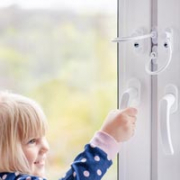 Supervised access to the garden or other outdoor space or environment is good for even the youngest of children. However, they must never be allowed to just wander into the garden or street unaccompanied (of course). There are countless dangers outside, including poisonous plants, stranger danger, cars and many other hazards. Even in your own garden there are usually hazards, from steps, inclines and level drops to dangerous garden tools plus another type of hazard we’ll see in our last tip below. Therefore exit points in the property need to be secure (see tip #4 above) and supervised at all times around the very young.
Supervised access to the garden or other outdoor space or environment is good for even the youngest of children. However, they must never be allowed to just wander into the garden or street unaccompanied (of course). There are countless dangers outside, including poisonous plants, stranger danger, cars and many other hazards. Even in your own garden there are usually hazards, from steps, inclines and level drops to dangerous garden tools plus another type of hazard we’ll see in our last tip below. Therefore exit points in the property need to be secure (see tip #4 above) and supervised at all times around the very young.
20. Water Hazards
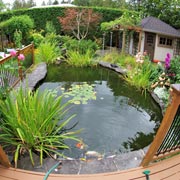 Gardens often have ponds or, if you’re lucky enough, hot tubs and even swimming pools. These are all hazards to young children. Even a puddle is a potential drowning hazard to the very young. It’s the same indoors, with baths and even basins of water being potential drowning hazards. So, once again, parents and any supervising adults need to be doing just that, i.e. supervising anywhere there is water. For different reasons, that’s even more the case around hot water, of course, and anywhere a child could potentially splash or pour water near electrics.
Gardens often have ponds or, if you’re lucky enough, hot tubs and even swimming pools. These are all hazards to young children. Even a puddle is a potential drowning hazard to the very young. It’s the same indoors, with baths and even basins of water being potential drowning hazards. So, once again, parents and any supervising adults need to be doing just that, i.e. supervising anywhere there is water. For different reasons, that’s even more the case around hot water, of course, and anywhere a child could potentially splash or pour water near electrics.
So, the main requirements for the safety of children are a continuous risk assessment, installing measures to reduce any risks identified, plus vigilance and supervision around young children at all times.
Little Cedars Nursery & Pre-school: an Outstanding Childcare Service in Streatham
Our Nursery is in Streatham, close to Furzedown, Tooting, Balham, Norbury & Colliers Wood
 Are you searching for the best nurseries or pre-schools in the Streatham area? Little Cedars is a wonderful nursery/pre-school offering an outstanding weekday childcare service for babies and children under-five. Our childcare setting is also very near to Streatham Hill, Streatham Park, Streatham Common, Furzedown, Tooting, Tooting Bec, Tooting Broadway, Tooting Common, Balham, Norbury and Colliers Wood, so may also suit you if you live or work in any of those London locations.
Are you searching for the best nurseries or pre-schools in the Streatham area? Little Cedars is a wonderful nursery/pre-school offering an outstanding weekday childcare service for babies and children under-five. Our childcare setting is also very near to Streatham Hill, Streatham Park, Streatham Common, Furzedown, Tooting, Tooting Bec, Tooting Broadway, Tooting Common, Balham, Norbury and Colliers Wood, so may also suit you if you live or work in any of those London locations.
If you’d like to apply for a place for your child, arrange a preliminary tour, or simply ask us a question, please get in touch. We’ll be delighted to help — please simply choose a button:
The ideas above are only a starting point. Every parent, carer or guardian is advised to methodically risk assess their home and any environment their child is likely to gain access to — and to take the appropriate safety precautions for their own particular child and situation.
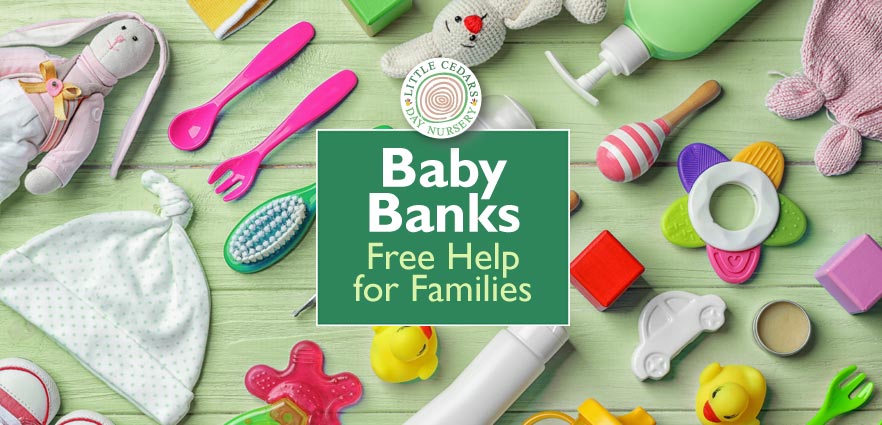
 Today’s post will appeal to families who are finding the current financial climate particularly challenging. With energy costs and inflation so high, the following may represent a welcome piece of good news. Today we highlight the many Baby Banks that are popping up all around the UK and explain how they can help struggling families, all for free.
Today’s post will appeal to families who are finding the current financial climate particularly challenging. With energy costs and inflation so high, the following may represent a welcome piece of good news. Today we highlight the many Baby Banks that are popping up all around the UK and explain how they can help struggling families, all for free. A Baby bank is a similar concept to a food bank. However, instead of food and drink, it provides second-hand clothing, toys and equipment for babies, under-fives and often even for children up to the age of 16 in some cases. Baby Banks can also be compared to a charity shop, however, with baby banks, everything is free.
A Baby bank is a similar concept to a food bank. However, instead of food and drink, it provides second-hand clothing, toys and equipment for babies, under-fives and often even for children up to the age of 16 in some cases. Baby Banks can also be compared to a charity shop, however, with baby banks, everything is free. Baby Banks are run by all sorts of different people and organisations and therefore the rules around actually getting ones hands on the free items vary from Baby Bank to Baby Bank. Some accept requests for items directly from families themselves. Others only deal via a referral from some kind of professional. Examples include social workers, family support agencies, teachers, family centres, health visitors, medical professionals, food banks and women’s refuges. So, once you have located your nearest Baby Bank, you will need to check whether they will deal with you directly or only through such a referral. Either way, you will usually need to agree a time and date for collection of your item with the Baby Bank (you can’t usually just turn up, although there are exceptions). Not all Baby Banks are open all week and that’s another reason to check with Baby Banks or their websites first.
Baby Banks are run by all sorts of different people and organisations and therefore the rules around actually getting ones hands on the free items vary from Baby Bank to Baby Bank. Some accept requests for items directly from families themselves. Others only deal via a referral from some kind of professional. Examples include social workers, family support agencies, teachers, family centres, health visitors, medical professionals, food banks and women’s refuges. So, once you have located your nearest Baby Bank, you will need to check whether they will deal with you directly or only through such a referral. Either way, you will usually need to agree a time and date for collection of your item with the Baby Bank (you can’t usually just turn up, although there are exceptions). Not all Baby Banks are open all week and that’s another reason to check with Baby Banks or their websites first. Absolutely! Baby Banks rely on the generous donations from families that no long require their baby clothes or equipment. Perhaps the child has grown out of them and the items are still in good condition, or perhaps they were an unwanted gift. Donating items is also a great way to declutter and to make space in the home, as well as helping others. However, before donating to a Baby Bank, always check with them to see if all your proposed items are required and, as before, ensure you know whether an appointment is needed or whether you can just turn up with your items. Certain rules may also apply around the condition and type of items (this varies depending upon which Baby Bank you are dealing with). Baby car seats and electronic items may also have special rules due to the extra safety considerations.
Absolutely! Baby Banks rely on the generous donations from families that no long require their baby clothes or equipment. Perhaps the child has grown out of them and the items are still in good condition, or perhaps they were an unwanted gift. Donating items is also a great way to declutter and to make space in the home, as well as helping others. However, before donating to a Baby Bank, always check with them to see if all your proposed items are required and, as before, ensure you know whether an appointment is needed or whether you can just turn up with your items. Certain rules may also apply around the condition and type of items (this varies depending upon which Baby Bank you are dealing with). Baby car seats and electronic items may also have special rules due to the extra safety considerations.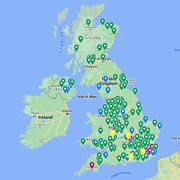 Where Can I Find My Nearest Baby Bank?
Where Can I Find My Nearest Baby Bank?
 Little Cedars Nursery supports Government-funded childcare schemes for eligible families and this is another way they can save significant money. We support schemes for 15 hours per week of free childcare for eligible 2-year-olds, 15 hours of free childcare per week for 3 & 4-year-olds living in England and up to 30 hours per week for them if eligible for the top-up. We also support students requiring childcare through Student Childcare Grants & Schemes, families accessing Tax-Free Childcare, Free Childcare through Universal Credit, Childcare Vouchers and so on.
Little Cedars Nursery supports Government-funded childcare schemes for eligible families and this is another way they can save significant money. We support schemes for 15 hours per week of free childcare for eligible 2-year-olds, 15 hours of free childcare per week for 3 & 4-year-olds living in England and up to 30 hours per week for them if eligible for the top-up. We also support students requiring childcare through Student Childcare Grants & Schemes, families accessing Tax-Free Childcare, Free Childcare through Universal Credit, Childcare Vouchers and so on.
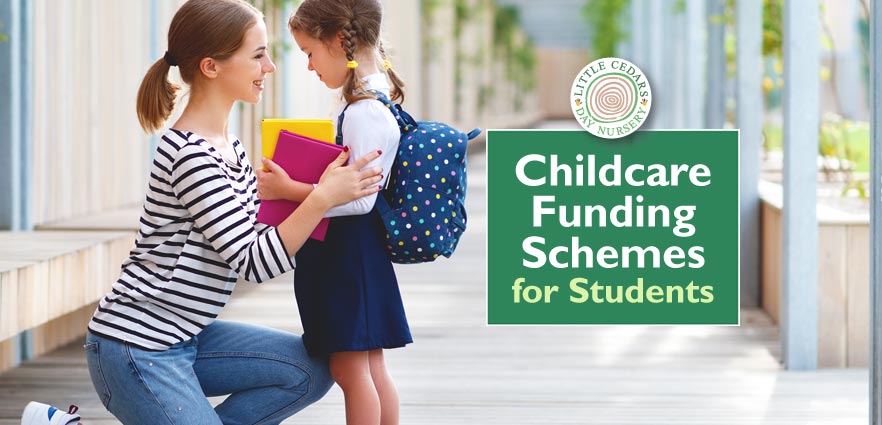
 Are you a student as well as a parent? If so, there are several Government schemes that offer help with childcare costs, some of which will save student parents substantial amounts of money. By doing so, they also make the prospect of juggling parenthood with being a student much more manageable. Today we examine the key childcare funding options, including how the type of course and the age of the parent affect eligibility.
Are you a student as well as a parent? If so, there are several Government schemes that offer help with childcare costs, some of which will save student parents substantial amounts of money. By doing so, they also make the prospect of juggling parenthood with being a student much more manageable. Today we examine the key childcare funding options, including how the type of course and the age of the parent affect eligibility. The very generous Student Childcare Grant is available for eligible students who who are studying full-time on a higher education course and have dependent children aged 14 or under (16 or under if they have special needs).
The very generous Student Childcare Grant is available for eligible students who who are studying full-time on a higher education course and have dependent children aged 14 or under (16 or under if they have special needs). If you are aged 20 or over, are a parent studying in further education for a qualification on a Level 3 course or below and are facing financial hardship, you may be eligible for childcare funding under the Learner Support scheme. This funding could help you with childcare and other study-related costs if you fit the right eligibility criteria.
If you are aged 20 or over, are a parent studying in further education for a qualification on a Level 3 course or below and are facing financial hardship, you may be eligible for childcare funding under the Learner Support scheme. This funding could help you with childcare and other study-related costs if you fit the right eligibility criteria. If you are a parent as well as a student aged under 20 when you begin one of a range of publicly-funded courses in England, you may be eligible for childcare funding through the Care to Learn bursary scheme. If eligible, you could claim as much as £175 in childcare per week, per child if you live in London, reducing to £160 per week, per child, outside London.
If you are a parent as well as a student aged under 20 when you begin one of a range of publicly-funded courses in England, you may be eligible for childcare funding through the Care to Learn bursary scheme. If eligible, you could claim as much as £175 in childcare per week, per child if you live in London, reducing to £160 per week, per child, outside London.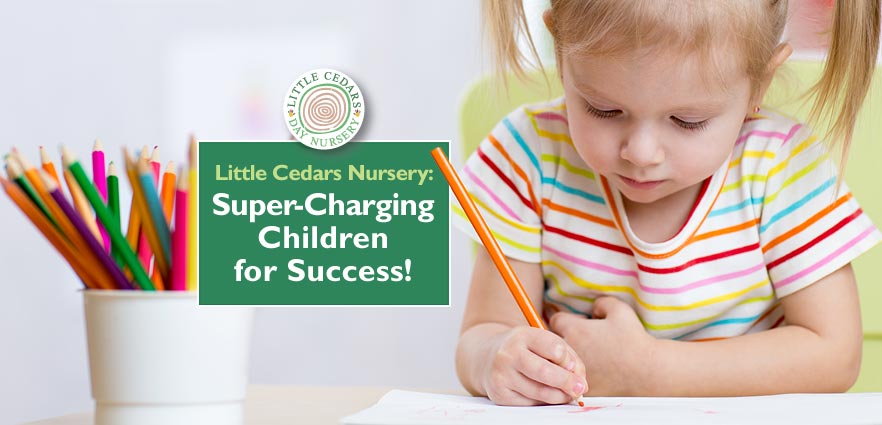
 A childcare nursery should not be thought of only as a crèche, playgroup, or simply somewhere that looks after babies and children while parents go to work. Good nurseries and pre-schools like Little Cedars are so much more than that. It’s incredible just how much they benefit under-fives, families and society as a whole once you take a closer look at everything they do — and that’s exactly what we’re doing today…
A childcare nursery should not be thought of only as a crèche, playgroup, or simply somewhere that looks after babies and children while parents go to work. Good nurseries and pre-schools like Little Cedars are so much more than that. It’s incredible just how much they benefit under-fives, families and society as a whole once you take a closer look at everything they do — and that’s exactly what we’re doing today… What’s more, staff at childcare settings like Little Cedars will form close bonds with little ones. Studies show that
What’s more, staff at childcare settings like Little Cedars will form close bonds with little ones. Studies show that  Good Ofsted-registered nurseries/pre-schools like Little Cedars also give under-fives a full early years education. That’s important to know. Through a learning and development programme that’s customised to each individual child, we ensure they achieve their own personal bests in all areas of the statutory
Good Ofsted-registered nurseries/pre-schools like Little Cedars also give under-fives a full early years education. That’s important to know. Through a learning and development programme that’s customised to each individual child, we ensure they achieve their own personal bests in all areas of the statutory  Part of children’s personal, social and emotional development comes through active play with other children that they meet and get to know at the nursery. This is firstly great fun, of course, and that’s a hugely important part of any happy childhood. However, they’ll also learn many things through play. Without socialising with others, it would be more difficult to improve social skills, for example. Only by being around other children will they learn to account for the feelings of others, learn to respect one another and ultimately form close bonds, trust and friendships. Many such friendships will indeed continue long afterwards, as children move to schools at the age of five.
Part of children’s personal, social and emotional development comes through active play with other children that they meet and get to know at the nursery. This is firstly great fun, of course, and that’s a hugely important part of any happy childhood. However, they’ll also learn many things through play. Without socialising with others, it would be more difficult to improve social skills, for example. Only by being around other children will they learn to account for the feelings of others, learn to respect one another and ultimately form close bonds, trust and friendships. Many such friendships will indeed continue long afterwards, as children move to schools at the age of five. Another key aim of good early years childcare provision is to prepare children thoroughly for school. Why? Because
Another key aim of good early years childcare provision is to prepare children thoroughly for school. Why? Because 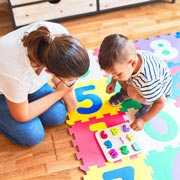 It’s almost as if children are super-charged for success — the benefits of a good early years education are surprisingly long lasting. Some studies even show that the benefits last into people’s working lives, improving salaries (
It’s almost as if children are super-charged for success — the benefits of a good early years education are surprisingly long lasting. Some studies even show that the benefits last into people’s working lives, improving salaries ( Working so closely with babies, toddlers and preschoolers allows us to continually monitor their individual progress. In so doing, we are in a prime position to spot any issues early and to make appropriate arrangements to mitigate them if needed. For example, we may spot that a child is finding reading challenging. If so, we can put extra effort and time into improving the situation for the child. On occasion, that may even include talking to parents about the possible intervention of a specialist of some kind, or it could simply be that they need to practise specific activities to overcome the issue. The earlier challenges or any special educational or developmental needs are spotted, the sooner the child in question can be helped.
Working so closely with babies, toddlers and preschoolers allows us to continually monitor their individual progress. In so doing, we are in a prime position to spot any issues early and to make appropriate arrangements to mitigate them if needed. For example, we may spot that a child is finding reading challenging. If so, we can put extra effort and time into improving the situation for the child. On occasion, that may even include talking to parents about the possible intervention of a specialist of some kind, or it could simply be that they need to practise specific activities to overcome the issue. The earlier challenges or any special educational or developmental needs are spotted, the sooner the child in question can be helped.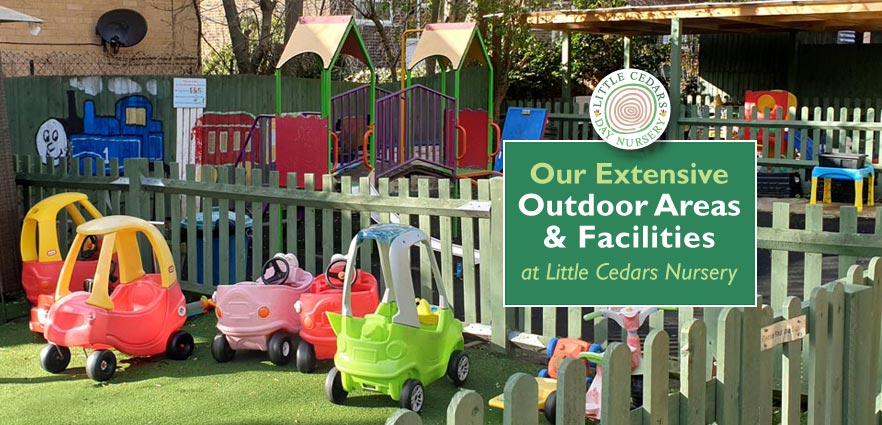
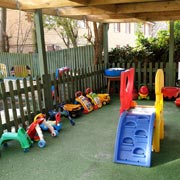 We have a huge outdoor area for children at Little Cedars Nursery, Streatham. Parents express their surprise when they first see it, regularly commenting that it’s much larger than the outdoor areas of other nurseries and pre-schools in the area. Our extensive outdoor play areas are also packed full of fun, educational play equipment and facilities that our under-five children absolutely adore. That includes areas and facilities set up especially for particular age groups.
We have a huge outdoor area for children at Little Cedars Nursery, Streatham. Parents express their surprise when they first see it, regularly commenting that it’s much larger than the outdoor areas of other nurseries and pre-schools in the area. Our extensive outdoor play areas are also packed full of fun, educational play equipment and facilities that our under-five children absolutely adore. That includes areas and facilities set up especially for particular age groups.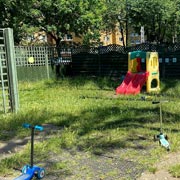 The outdoor ‘mud kitchen’ is a particular hit with children at the nursery. They can enjoy creating in the sand play and water play areas too. These are fun and educational activities —
The outdoor ‘mud kitchen’ is a particular hit with children at the nursery. They can enjoy creating in the sand play and water play areas too. These are fun and educational activities — 
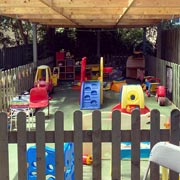 As you can see from some of the photographs, the nursery’s extensive outdoor areas include both open-air and undercover areas. That means children can play and explore whatever the weather. Outdoor play is good for children, teaching them some things that simply can’t be taught indoors, so it’s wonderful that many of the outdoor facilities can be used all-year-round.
As you can see from some of the photographs, the nursery’s extensive outdoor areas include both open-air and undercover areas. That means children can play and explore whatever the weather. Outdoor play is good for children, teaching them some things that simply can’t be taught indoors, so it’s wonderful that many of the outdoor facilities can be used all-year-round. Outdoor play at Little Cedars Nursery also supports the Early Years Foundation Stage (EYFS) curriculum. Learning through outdoor play teaches children so much and in a natural way. Outdoor play supports such areas as communication & language, physical development, personal, social and emotional development and understanding the world. Many such lessons come naturally as children play with one another and interact together via outdoor activities.
Outdoor play at Little Cedars Nursery also supports the Early Years Foundation Stage (EYFS) curriculum. Learning through outdoor play teaches children so much and in a natural way. Outdoor play supports such areas as communication & language, physical development, personal, social and emotional development and understanding the world. Many such lessons come naturally as children play with one another and interact together via outdoor activities.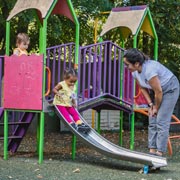 Such staff will continuously identify the individual interests and needs of each child and ensure that the learning and development activities they access will benefit them in the optimum ways. The idea is to further strengthen existing areas where children are strong, while bolstering children’s skills in areas that may require extra focus.
Such staff will continuously identify the individual interests and needs of each child and ensure that the learning and development activities they access will benefit them in the optimum ways. The idea is to further strengthen existing areas where children are strong, while bolstering children’s skills in areas that may require extra focus.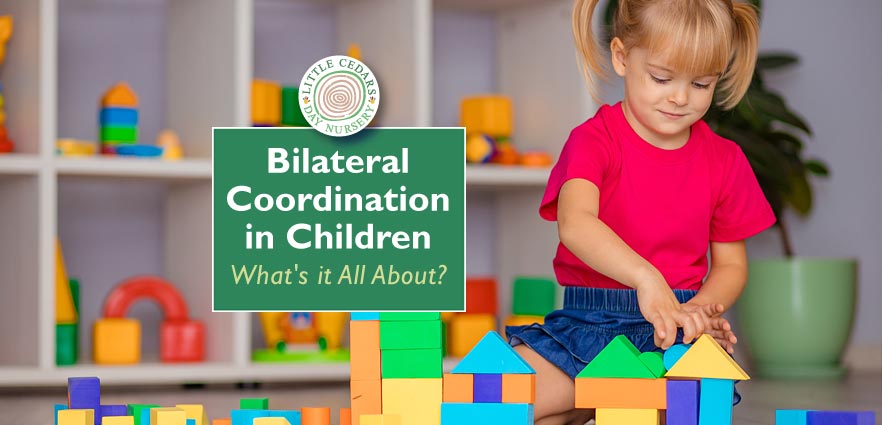
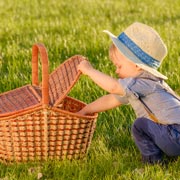 Bilateral coordination is an important skill for children to master and is something that parents should look out for as children develop in their early years. Today we look at the topic, explaining what it is, why it’s important and how mastery of the skill benefits little ones.
Bilateral coordination is an important skill for children to master and is something that parents should look out for as children develop in their early years. Today we look at the topic, explaining what it is, why it’s important and how mastery of the skill benefits little ones. You may also hear reference to the phrase crossing the midline and this is also linked to bilateral coordination. It refers to a person reaching across their body, from one side to the opposite side, in order to complete a task. An example would be a child reaching with their right hand, across their body, to pick up a toy that’s to their left. Crossing the midline in such a way is a significant step because it demonstrates that infants have progressed from naturally using the side of their body nearest the object to using a dominant or preferred side. This may be the first indication parents have of whether their child is going to be left- or right-handed.
You may also hear reference to the phrase crossing the midline and this is also linked to bilateral coordination. It refers to a person reaching across their body, from one side to the opposite side, in order to complete a task. An example would be a child reaching with their right hand, across their body, to pick up a toy that’s to their left. Crossing the midline in such a way is a significant step because it demonstrates that infants have progressed from naturally using the side of their body nearest the object to using a dominant or preferred side. This may be the first indication parents have of whether their child is going to be left- or right-handed.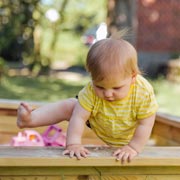 uncoordinated and will struggle with a variety of physical tasks.
uncoordinated and will struggle with a variety of physical tasks.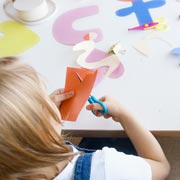 Reciprocal bilateral coordination: this is where both sides of the body form a rhythmic motion but the movements on each side alternate. Examples include walking, swimming and cycling.
Reciprocal bilateral coordination: this is where both sides of the body form a rhythmic motion but the movements on each side alternate. Examples include walking, swimming and cycling. Mastery of bilateral coordination requires children to develop and fine-tune three types of motor skill:
Mastery of bilateral coordination requires children to develop and fine-tune three types of motor skill: Threading beads on a string, or string through holes punched though paper or card;
Threading beads on a string, or string through holes punched though paper or card; Play-doh — squeezing and rolling it, including use of tools to shape it;
Play-doh — squeezing and rolling it, including use of tools to shape it; These are just a few examples. Any age-appropriate game or activity is likely to help improve bilateral coordination so long as it requires precise, measured movements and coordination of both sides of the body. It’s a case of the child practising over time, often through play, until a particular physical outcome has been mastered. Progress is particularly easy to see in babies and infants as they gradually become more physically able, dextrous, strong and coordinated.
These are just a few examples. Any age-appropriate game or activity is likely to help improve bilateral coordination so long as it requires precise, measured movements and coordination of both sides of the body. It’s a case of the child practising over time, often through play, until a particular physical outcome has been mastered. Progress is particularly easy to see in babies and infants as they gradually become more physically able, dextrous, strong and coordinated.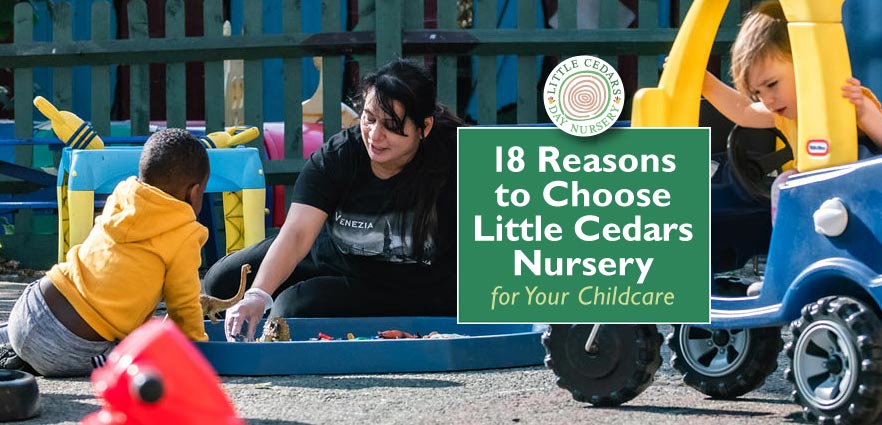
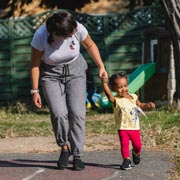 Independent feedback from other parents is worth its weight in gold. In the last five years, Little Cedars has received only 5-star reviews on Google and Facebook. That’s top marks, consistently for 5 years running.* Comments that accompanied these independent reviews were equally compelling — here are just a few examples:
Independent feedback from other parents is worth its weight in gold. In the last five years, Little Cedars has received only 5-star reviews on Google and Facebook. That’s top marks, consistently for 5 years running.* Comments that accompanied these independent reviews were equally compelling — here are just a few examples: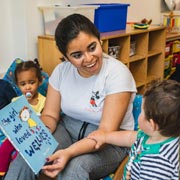 Little Cedars is a warm, welcoming and nurturing environment. To the babies and children, it very much becomes a home-from-home where they feel safe, valued, cared for and all with wonderful, close relationships with both peers and our childcare professionals. It’s also a place of immense fun where little ones are happy, stimulated and nurtured in order to bring out the best in them.
Little Cedars is a warm, welcoming and nurturing environment. To the babies and children, it very much becomes a home-from-home where they feel safe, valued, cared for and all with wonderful, close relationships with both peers and our childcare professionals. It’s also a place of immense fun where little ones are happy, stimulated and nurtured in order to bring out the best in them.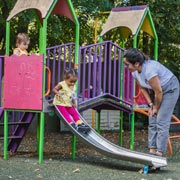 Little Cedars Nursery is extremely well resourced and equipped, both inside and out.
Little Cedars Nursery is extremely well resourced and equipped, both inside and out. 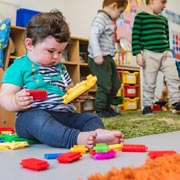 If your 2-year-old is eligible for the Government’s free childcare scheme for this age group, rest assured that Little Cedars Day Nursery supports them and this can potentially give your little one 15 free hours of childcare per week for as many as 38 weeks of the year. That’s 570 free childcare hours per year for your 2-year-old!
If your 2-year-old is eligible for the Government’s free childcare scheme for this age group, rest assured that Little Cedars Day Nursery supports them and this can potentially give your little one 15 free hours of childcare per week for as many as 38 weeks of the year. That’s 570 free childcare hours per year for your 2-year-old! A Key Person is assigned to each child at Little Cedars Nursery. This is an early years practitioner who ensures that the child’s needs are being catered for and that their care at the setting is tailored to them as an individual. They help children settle in when they first join the nursery and build strong relationships with both the child and the parents. They are therefore usually the natural and key point of contact at the nursery.
A Key Person is assigned to each child at Little Cedars Nursery. This is an early years practitioner who ensures that the child’s needs are being catered for and that their care at the setting is tailored to them as an individual. They help children settle in when they first join the nursery and build strong relationships with both the child and the parents. They are therefore usually the natural and key point of contact at the nursery.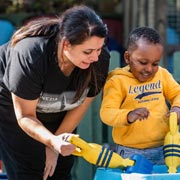 We have a very special team at Little Cedars Nursery. Every one of them has been hand picked to ensure they are the perfect fit for the nursery and for the children therein. They’re warm, natural carers who will form wonderful relationships with children and bring out the very best in them. They become the children’s safe, familiar and friendly faces at the setting as well as facilitating top-notch learning and early years education. They also ensure every child is happy and is having fun whilst under our care.
We have a very special team at Little Cedars Nursery. Every one of them has been hand picked to ensure they are the perfect fit for the nursery and for the children therein. They’re warm, natural carers who will form wonderful relationships with children and bring out the very best in them. They become the children’s safe, familiar and friendly faces at the setting as well as facilitating top-notch learning and early years education. They also ensure every child is happy and is having fun whilst under our care.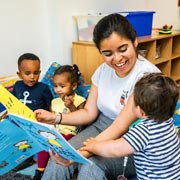 At Little Cedars we do so much more than simply look after babies, toddlers and under-fives. We educate and nurture them too. In fact, we ensure that our little ones achieve personal bests in all 7 areas of
At Little Cedars we do so much more than simply look after babies, toddlers and under-fives. We educate and nurture them too. In fact, we ensure that our little ones achieve personal bests in all 7 areas of 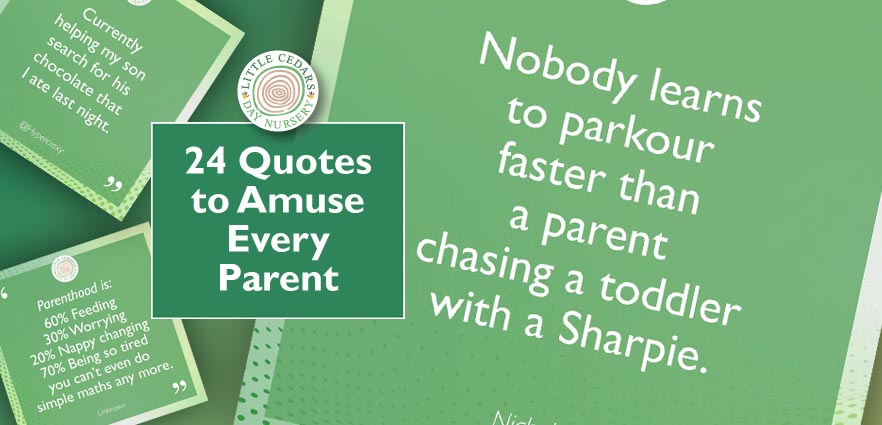
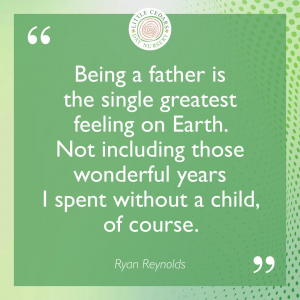
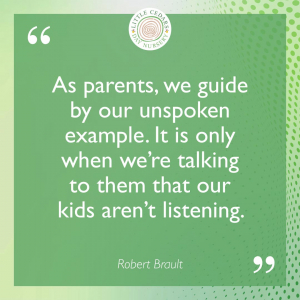
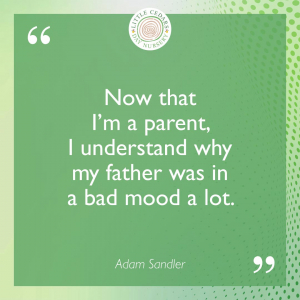
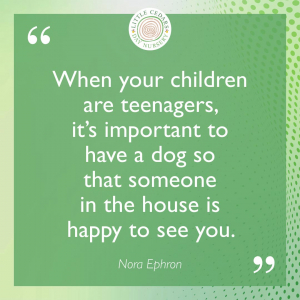
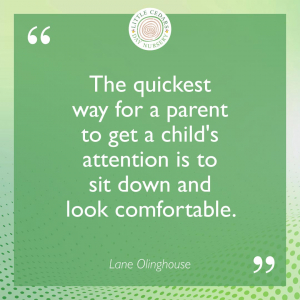
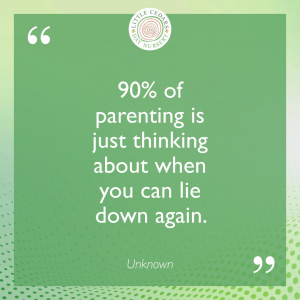
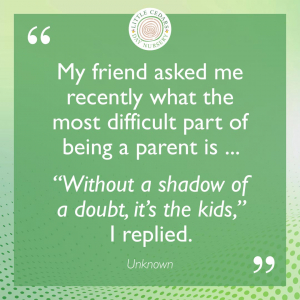

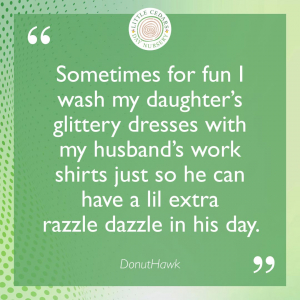
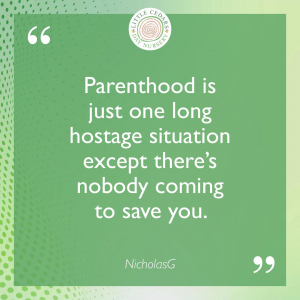
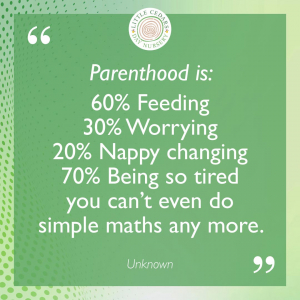

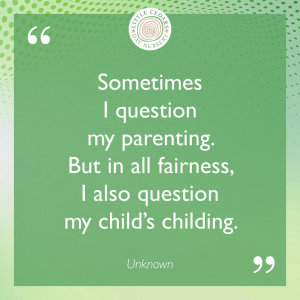
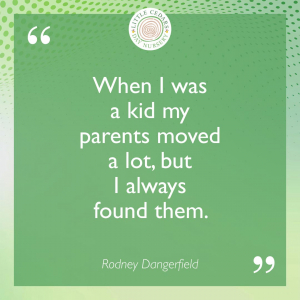
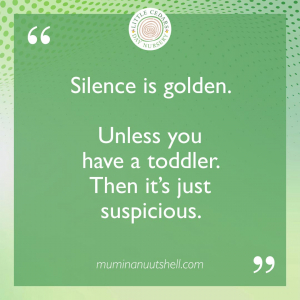
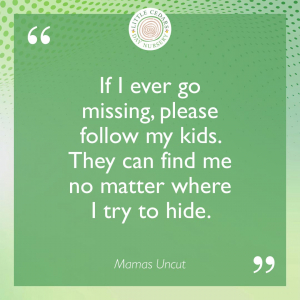
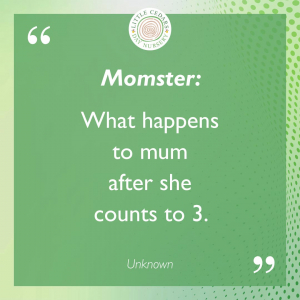
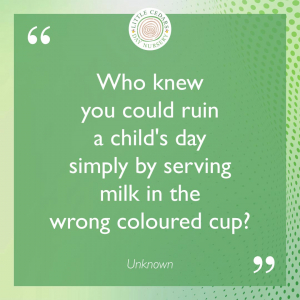
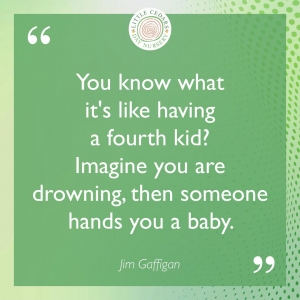
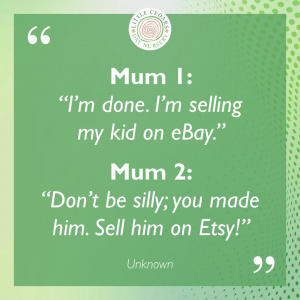
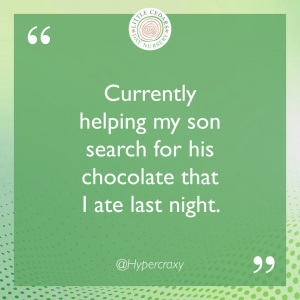
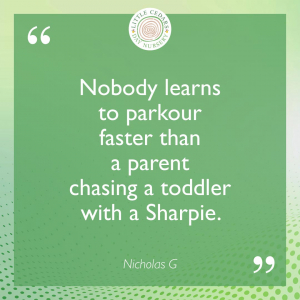

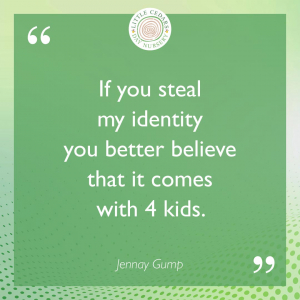

 June 2022 has seen the release of a new set of recommendations that outline ways to reduce the likelihood of sleep-related deaths amongst babies and infants up to the age of 1. This includes, but is not limited to, deaths related to Sudden Infant Death Syndrome (SIDS). Sadly, SIDS and other sleep-related issues are responsible for nearly 200 infant deaths in the UK each year and up to a staggering 3,500 every year in the United States. Perhaps even more surprisingly, that last number has not reduced at all in the last 30 or so years. This new set of recommendations from experts in the U.S. aims to change that and is something that all parents need to take a look at if they have a baby or infant. Let’s take a look at the new guidance …
June 2022 has seen the release of a new set of recommendations that outline ways to reduce the likelihood of sleep-related deaths amongst babies and infants up to the age of 1. This includes, but is not limited to, deaths related to Sudden Infant Death Syndrome (SIDS). Sadly, SIDS and other sleep-related issues are responsible for nearly 200 infant deaths in the UK each year and up to a staggering 3,500 every year in the United States. Perhaps even more surprisingly, that last number has not reduced at all in the last 30 or so years. This new set of recommendations from experts in the U.S. aims to change that and is something that all parents need to take a look at if they have a baby or infant. Let’s take a look at the new guidance … PLEASE NOTE: we have summarised key points from the new guidance in good faith but advise parents/carers of babies and infants to do their own research.
PLEASE NOTE: we have summarised key points from the new guidance in good faith but advise parents/carers of babies and infants to do their own research. 
 Once babies can crawl, they’re well on their way to becoming toddlers. Then, in no time at all, they can suddenly become fully mobile, able to climb and even be out of your sight in just seconds. With this new mobility comes exploration, the potential for danger and even possible injury. With that in mind, we bring you 20 ways to begin childproofing your home to keep little ones safer and further from harm’s way.
Once babies can crawl, they’re well on their way to becoming toddlers. Then, in no time at all, they can suddenly become fully mobile, able to climb and even be out of your sight in just seconds. With this new mobility comes exploration, the potential for danger and even possible injury. With that in mind, we bring you 20 ways to begin childproofing your home to keep little ones safer and further from harm’s way. Safety gates, strategically placed around the home, are a great way to keep your little one confined to a safer, controlled area. There are lots of different types available, whether new or second-hand, but make sure they’re made to UK safety standards. Some are suitable for doorways and others for stairs. Using safety gates to keep young children away from stairs, kitchens and other hazardous places really is a no-brainer and a great place to start with your childproofing exercise.
Safety gates, strategically placed around the home, are a great way to keep your little one confined to a safer, controlled area. There are lots of different types available, whether new or second-hand, but make sure they’re made to UK safety standards. Some are suitable for doorways and others for stairs. Using safety gates to keep young children away from stairs, kitchens and other hazardous places really is a no-brainer and a great place to start with your childproofing exercise. Clear floor-to-ceiling glass is also a hazard once children are mobile. Therefore such glass, whether part of a window, patio door, glass partition or conservatory should ideally not be clear all the way down. Otherwise, an unsuspecting child — or even adult — could find themselves running straight through what they thought was an opening. An easy way to ensure glass can be seen as a barrier is to use strategically placed stickers dotted around on the glass. These could be fun and attractive, for example little flower or butterfly stickers. Alternatively, you can even buy modern-looking ‘frosting’ strips that, when applied in one or more horizontal stripes or shapes at an appropriate height, will make clear glass more visible to you and your child. Guards are, of course, another possible temporary option.
Clear floor-to-ceiling glass is also a hazard once children are mobile. Therefore such glass, whether part of a window, patio door, glass partition or conservatory should ideally not be clear all the way down. Otherwise, an unsuspecting child — or even adult — could find themselves running straight through what they thought was an opening. An easy way to ensure glass can be seen as a barrier is to use strategically placed stickers dotted around on the glass. These could be fun and attractive, for example little flower or butterfly stickers. Alternatively, you can even buy modern-looking ‘frosting’ strips that, when applied in one or more horizontal stripes or shapes at an appropriate height, will make clear glass more visible to you and your child. Guards are, of course, another possible temporary option. Whether they’re in the kitchen, on the landing, under the stairs or elsewhere, cupboards can represent a number of possible hazards to children. Fingers can be hurt if shut in the doors or near the hinges and the cupboards themselves can contain any number of dangerous things. Therefore, it’s wise to obtain some childproof locks, latches or catches for cupboard doors that you don’t want your child to be able to open. These are often simple, easy to affix (and remove when children are older) and can be inexpensive if you shop around.
Whether they’re in the kitchen, on the landing, under the stairs or elsewhere, cupboards can represent a number of possible hazards to children. Fingers can be hurt if shut in the doors or near the hinges and the cupboards themselves can contain any number of dangerous things. Therefore, it’s wise to obtain some childproof locks, latches or catches for cupboard doors that you don’t want your child to be able to open. These are often simple, easy to affix (and remove when children are older) and can be inexpensive if you shop around. Similarly, ensure that entrance/exit doors throughout your home are secure where they need to be. Front doors, doors to gardens, balconies and patios all need to be particularly well secured from access by young children, whether through locks, latches or specialist childproofing mechanisms (there are lots available on the market). Similarly, windows need to be secure and that’s never more true than when there’s a nasty drop the other side.
Similarly, ensure that entrance/exit doors throughout your home are secure where they need to be. Front doors, doors to gardens, balconies and patios all need to be particularly well secured from access by young children, whether through locks, latches or specialist childproofing mechanisms (there are lots available on the market). Similarly, windows need to be secure and that’s never more true than when there’s a nasty drop the other side. Everything with a motor or moving parts is a potential hazard to small children. The obvious items to keep well beyond their reach are tools like drills and saws along with household appliances like vacuums, food mixers and coffee-makers. However, larger things like washing machines, tumble driers, dishwashers and any appliance with a door that they could climb into are also potentially very dangerous for little ones. It may even take a combination of precautions to keep children safe from such hazards.
Everything with a motor or moving parts is a potential hazard to small children. The obvious items to keep well beyond their reach are tools like drills and saws along with household appliances like vacuums, food mixers and coffee-makers. However, larger things like washing machines, tumble driers, dishwashers and any appliance with a door that they could climb into are also potentially very dangerous for little ones. It may even take a combination of precautions to keep children safe from such hazards. Another reason to keep little ones out of cupboards and certain areas of the home is to keep them safe from hazardous products. Some things will be poisonous and others may be corrosive. Dishwasher and laundry pods need to be stored well out of children’s reach as do medicines, cleaning products and DIY items like paint, solvents and glues. Any of these could prove fatal if they get into little hands. Remember, too, that children learn to climb, so even cupboards high up need to be secured.
Another reason to keep little ones out of cupboards and certain areas of the home is to keep them safe from hazardous products. Some things will be poisonous and others may be corrosive. Dishwasher and laundry pods need to be stored well out of children’s reach as do medicines, cleaning products and DIY items like paint, solvents and glues. Any of these could prove fatal if they get into little hands. Remember, too, that children learn to climb, so even cupboards high up need to be secured. Smoke alarms suitably located around the home are one of the most basic precautions any parent or carer can make. Countless lives are saved each year due to smoke alarms. Sadly, though, many are also lost due to them not being present or due to batteries having expired. So, ensure that smoke alarms are ideally in every room as well as being in hallways, stairwells and so on. Also test them regularly to ensure batteries are in good, working order.
Smoke alarms suitably located around the home are one of the most basic precautions any parent or carer can make. Countless lives are saved each year due to smoke alarms. Sadly, though, many are also lost due to them not being present or due to batteries having expired. So, ensure that smoke alarms are ideally in every room as well as being in hallways, stairwells and so on. Also test them regularly to ensure batteries are in good, working order. For similar reasons, it’s also wise to keep electrical wire cords tidy and out of reach of little ones. If they were to pull a kettle lead or trip over an electric iron lead, for example, the potential outcomes do not bear thinking about. Cords on telephones and electrical appliances are also choking hazards, of course. So, keep them out of harm’s way i.e. well out of grabbing and tripping distance.
For similar reasons, it’s also wise to keep electrical wire cords tidy and out of reach of little ones. If they were to pull a kettle lead or trip over an electric iron lead, for example, the potential outcomes do not bear thinking about. Cords on telephones and electrical appliances are also choking hazards, of course. So, keep them out of harm’s way i.e. well out of grabbing and tripping distance. Dangling pull-cords on window blinds have, regrettably, been the cause of several deaths around the world. If they’re dangling down, small children could get these wrapped around their necks and potentially strangle themselves. Any toggle on the end of the cords can also be a choking hazard. So, if you have any of these in your home, ensure they are tied safely out of reach, ideally using the safety fitments that often come with new blinds, or are available inexpensively. The same kind of approach may also be needed in rooms where the electrical light, shower or extractor switch comes in a pull-cord form.
Dangling pull-cords on window blinds have, regrettably, been the cause of several deaths around the world. If they’re dangling down, small children could get these wrapped around their necks and potentially strangle themselves. Any toggle on the end of the cords can also be a choking hazard. So, if you have any of these in your home, ensure they are tied safely out of reach, ideally using the safety fitments that often come with new blinds, or are available inexpensively. The same kind of approach may also be needed in rooms where the electrical light, shower or extractor switch comes in a pull-cord form. Heat sources are a terrible hazard for children and adults alike. However, little ones will seldom realise the hazards, so parents and guardians need to ensure that all heat sources are kept well out of children’s reach. Examples include hair straighteners, irons, kettles, sandwich makers, pots and pans that have been on the cooker, and so on. With regard to cookers, hobs, grills, and ovens, it’s the children that need to be kept away from them, of course. Even a switched-off oven can still have a door that’s retained enough heat to burn little hands. A combination of several of the precautions outlined in this page may therefore help to make complete safety feasible in the kitchen and anywhere there are appliances that heat up.
Heat sources are a terrible hazard for children and adults alike. However, little ones will seldom realise the hazards, so parents and guardians need to ensure that all heat sources are kept well out of children’s reach. Examples include hair straighteners, irons, kettles, sandwich makers, pots and pans that have been on the cooker, and so on. With regard to cookers, hobs, grills, and ovens, it’s the children that need to be kept away from them, of course. Even a switched-off oven can still have a door that’s retained enough heat to burn little hands. A combination of several of the precautions outlined in this page may therefore help to make complete safety feasible in the kitchen and anywhere there are appliances that heat up. Radiators, heaters and, of course, fires, stoves and any other heat source in fireplaces are terribly dangerous things for children. Therefore radiator covers, fire guards, permanent vigilance and a good dose of common sense should enable parents and carers to keep children well away from such heat sources.
Radiators, heaters and, of course, fires, stoves and any other heat source in fireplaces are terribly dangerous things for children. Therefore radiator covers, fire guards, permanent vigilance and a good dose of common sense should enable parents and carers to keep children well away from such heat sources. Scissors, knives, razors, needles, hand tools like saws and screwdrivers must be locked well away and never left lying around. Even pens and pencils are sharp and dangerous around eyes, when you think about it. So, it’s imperative that parents/guardians are vigilant and supervise at all times when it comes to anything sharp or pointed.
Scissors, knives, razors, needles, hand tools like saws and screwdrivers must be locked well away and never left lying around. Even pens and pencils are sharp and dangerous around eyes, when you think about it. So, it’s imperative that parents/guardians are vigilant and supervise at all times when it comes to anything sharp or pointed. Vigilance will still be needed, however, as bumpers can only go so far.
Vigilance will still be needed, however, as bumpers can only go so far. Table cloths and table runners may look attractive but are another hazard around children, albeit a less obvious one. They look innocuous enough, but should a child grab one end and walk or fall way, they could end up with all sorts of things crashing upon them. When you think about what goes on tables (e.g. glassware, candles, china etc.), this could potentially be disastrous. So, the best advice is to completely avoid their use around young children and certainly never to allow any edges to hang down at ‘grabbing’ height.
Table cloths and table runners may look attractive but are another hazard around children, albeit a less obvious one. They look innocuous enough, but should a child grab one end and walk or fall way, they could end up with all sorts of things crashing upon them. When you think about what goes on tables (e.g. glassware, candles, china etc.), this could potentially be disastrous. So, the best advice is to completely avoid their use around young children and certainly never to allow any edges to hang down at ‘grabbing’ height. Supervised access to the garden or other outdoor space or environment is good for even the youngest of children. However, they must never be allowed to just wander into the garden or street unaccompanied (of course). There are countless dangers outside, including poisonous plants, stranger danger, cars and many other hazards. Even in your own garden there are usually hazards, from steps, inclines and level drops to dangerous garden tools plus another type of hazard we’ll see in our last tip below. Therefore exit points in the property need to be secure (see tip #4 above) and supervised at all times around the very young.
Supervised access to the garden or other outdoor space or environment is good for even the youngest of children. However, they must never be allowed to just wander into the garden or street unaccompanied (of course). There are countless dangers outside, including poisonous plants, stranger danger, cars and many other hazards. Even in your own garden there are usually hazards, from steps, inclines and level drops to dangerous garden tools plus another type of hazard we’ll see in our last tip below. Therefore exit points in the property need to be secure (see tip #4 above) and supervised at all times around the very young. Gardens often have ponds or, if you’re lucky enough, hot tubs and even swimming pools. These are all hazards to young children. Even a puddle is a potential drowning hazard to the very young. It’s the same indoors, with baths and even basins of water being potential drowning hazards. So, once again, parents and any supervising adults need to be doing just that, i.e. supervising anywhere there is water. For different reasons, that’s even more the case around hot water, of course, and anywhere a child could potentially splash or pour water near electrics.
Gardens often have ponds or, if you’re lucky enough, hot tubs and even swimming pools. These are all hazards to young children. Even a puddle is a potential drowning hazard to the very young. It’s the same indoors, with baths and even basins of water being potential drowning hazards. So, once again, parents and any supervising adults need to be doing just that, i.e. supervising anywhere there is water. For different reasons, that’s even more the case around hot water, of course, and anywhere a child could potentially splash or pour water near electrics.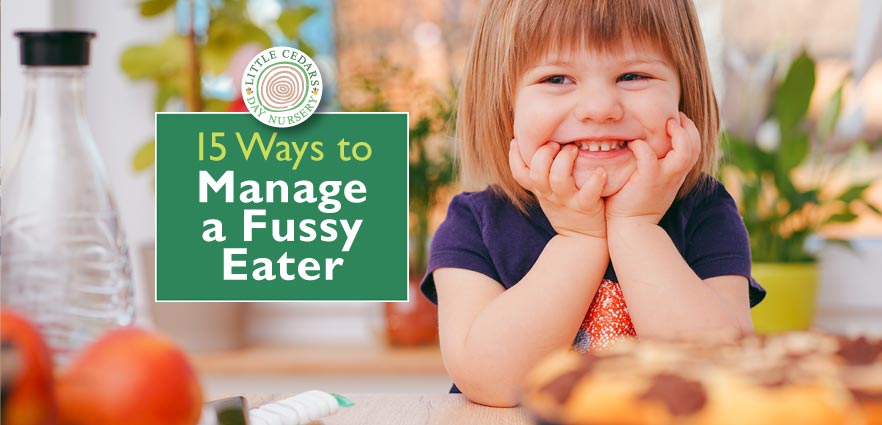
 It can be frustrating when children refuse to eat particular foods, often seemingly for no apparent reason. Much of it is new to them, though, if they’ve only recently been weaned off milk. So, firstly don’t get stressed about it. Refusing certain foods initially is quite normal for the very young. Often, all that is needed is a strategy for dealing with finicky eating and a little patience. Let’s take a look, today, at measures parents or carers can take to manage children who are fussy eaters. After all, it’s imperative that they have a healthy, balanced diet.
It can be frustrating when children refuse to eat particular foods, often seemingly for no apparent reason. Much of it is new to them, though, if they’ve only recently been weaned off milk. So, firstly don’t get stressed about it. Refusing certain foods initially is quite normal for the very young. Often, all that is needed is a strategy for dealing with finicky eating and a little patience. Let’s take a look, today, at measures parents or carers can take to manage children who are fussy eaters. After all, it’s imperative that they have a healthy, balanced diet. Similarly, some foods are an acquired taste, i.e. one that’s initially not liked, but is later appreciated and enjoyed. Avocados have a taste that’s quite subtle and delicate, for example. Because of that, some youngsters think they are bland — but may well love their subtle flavour and texture once they’re older. That’s an acquired taste. So, again, it’s worth encouraging your child to keep trying foods even if they don’t think they like them in the beginning.
Similarly, some foods are an acquired taste, i.e. one that’s initially not liked, but is later appreciated and enjoyed. Avocados have a taste that’s quite subtle and delicate, for example. Because of that, some youngsters think they are bland — but may well love their subtle flavour and texture once they’re older. That’s an acquired taste. So, again, it’s worth encouraging your child to keep trying foods even if they don’t think they like them in the beginning. If your child loves one food but not initially another, try using food bridges. This is when you pair one food with another food that you know they already like. You can start small and gradually increase the amount of the ‘new’ food. Adding cheese to potato or pasta is one example. Adding a small garnish of finely chopped herbs, vegetables or even fruit to pasta, rice, pulses or meat is another. These may slip under the child’s radar and this will help with gradual acceptance.
If your child loves one food but not initially another, try using food bridges. This is when you pair one food with another food that you know they already like. You can start small and gradually increase the amount of the ‘new’ food. Adding cheese to potato or pasta is one example. Adding a small garnish of finely chopped herbs, vegetables or even fruit to pasta, rice, pulses or meat is another. These may slip under the child’s radar and this will help with gradual acceptance. You could even make the food into fun pictures, all entirely made of the food you want them to eat. For example, peas could be made to represent a hill, broccoli could represent a wooded area, the yolk of a fried egg could represent the sun and so on. This approach will help children to see a fun aspect of food, and to engage more directly with it.
You could even make the food into fun pictures, all entirely made of the food you want them to eat. For example, peas could be made to represent a hill, broccoli could represent a wooded area, the yolk of a fried egg could represent the sun and so on. This approach will help children to see a fun aspect of food, and to engage more directly with it.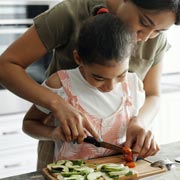 You could even get children involved in the creativity and choices around food. With the requisite care around safety, you could involve them in food preparation, choosing foods, deciding how they are displayed on the plate and so on. This will again get them more engaged around food and make it into a fun, creative activity. Children will love that. Remember, though, that this should only be taken so far. After all, you do not want to encourage them to always ‘play’ with their food.
You could even get children involved in the creativity and choices around food. With the requisite care around safety, you could involve them in food preparation, choosing foods, deciding how they are displayed on the plate and so on. This will again get them more engaged around food and make it into a fun, creative activity. Children will love that. Remember, though, that this should only be taken so far. After all, you do not want to encourage them to always ‘play’ with their food. When your child eats something that they’ve not been keen on eating before, give them positive feedback as this will encourage them. A well done here and a good job there will sometimes do wonders.
When your child eats something that they’ve not been keen on eating before, give them positive feedback as this will encourage them. A well done here and a good job there will sometimes do wonders.
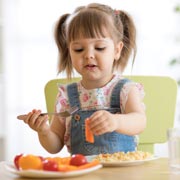 At Little Cedars Nursery in Streatham we know how finicky young children can sometimes be. So, we too occasionally employ some of the tactics described above. After all, food and a healthy, balanced diet is important and never more so than in children’s formative years. Study after study has shown this to be the case. Read our
At Little Cedars Nursery in Streatham we know how finicky young children can sometimes be. So, we too occasionally employ some of the tactics described above. After all, food and a healthy, balanced diet is important and never more so than in children’s formative years. Study after study has shown this to be the case. Read our 